Where can a career in Domestic Energy Assessment take you?
So, you’re thinking about a career in Domestic Energy Assessment? You’re in the right place. As the UK’s leading government-approved training provider for energy assessment and retrofit training, we’re here to show you where to start and where this career can take you.
Becoming a Domestic Energy Assessor (DEA) offers flexibility, stability, and the chance to play a key role in the UK’s journey toward net zero. Whether you’re looking for a new career, to grow your property expertise, or to build your own business, DEA training is a smart first step.
Use the links below to explore each stage of your energy assessment career journey:
The Starting Point
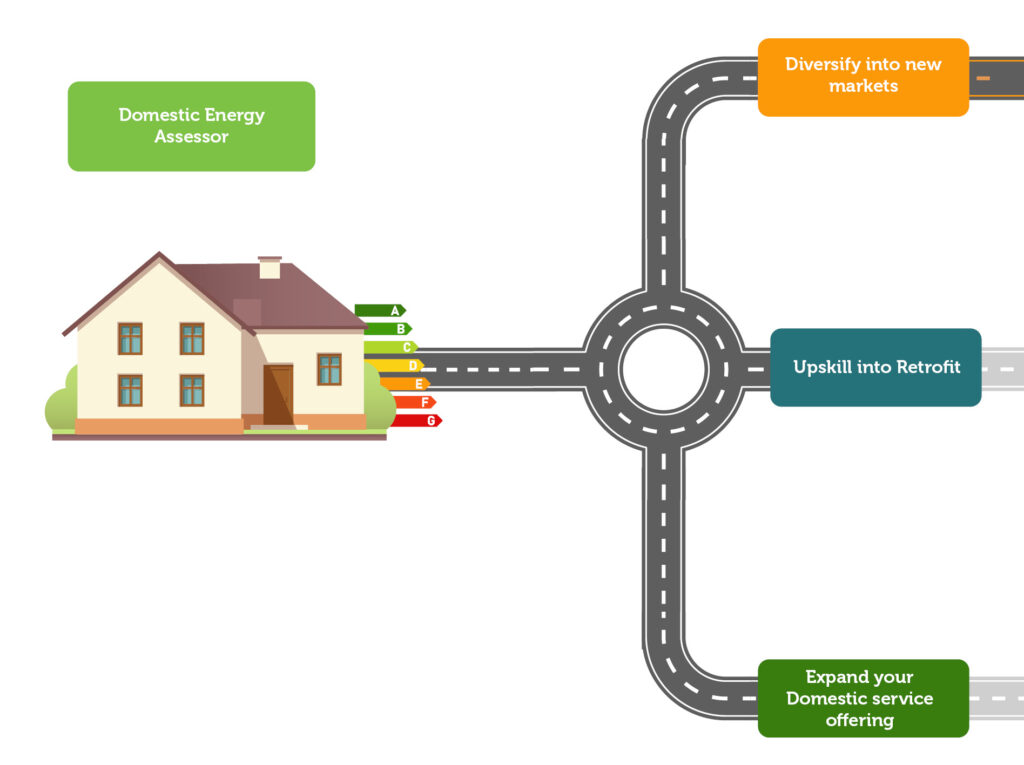
Domestic Energy Assessors are at the heart of the UK’s energy efficiency sector. They carry out non-invasive assessments on homes, from houses to flats, using RdSAP software to calculate energy efficiency and produce Energy Performance Certificates (EPCs). These certificates give properties a rating from A (most efficient) to G (least efficient), helping homeowners, landlords, and buyers make informed decisions.
To qualify, you’ll complete a Level 3 Domestic Energy Assessor course, which equips you with the skills to conduct assessments and join a government-approved accreditation scheme like Elmhurst’s. Once qualified, you can choose to work as a self-employed DEA or as part of a larger organisation. But this is only the beginning – DEA training can open doors to multiple career pathways, from rental compliance and retrofit projects to commercial energy assessments.
Who Can Become a Domestic Energy Assessor?
You don’t need any prior experience to become a Domestic Energy Assessor (DEA) and many people join the industry from completely different backgrounds. The training is designed to take you from beginner to qualified assessor, providing you with all the knowledge and practical skills you need to start producing compliant Energy Performance Certificates (EPCs).
Expanding Your Services in the Domestic Sector
Once qualified, many DEAs choose to diversify their services to increase earning potential and offer greater value to clients. A practical way to do this is by adding services that complement EPC assessments and fit naturally into a single property visit.
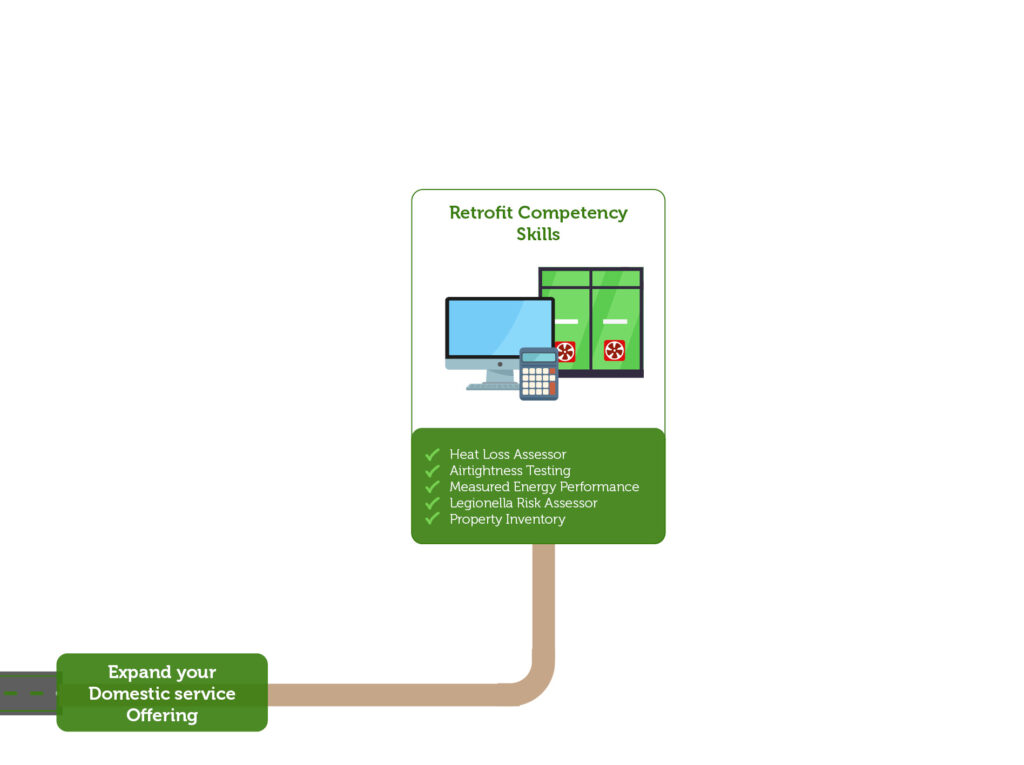

Property Inventory and Legionella Risk Assessments
Property Inventory and Legionella Risk Assessments are excellent ways to complement your work as a Domestic Energy Assessor. Both services can often be carried out during the same site visit as an EPC, making the process more efficient for you and more convenient for your clients.
Property Inventories help landlords and agents meet legal obligations and protect assets by documenting property condition at key stages of a tenancy. They are typically completed at the start or end of a tenancy, which often aligns perfectly with the need for an updated EPC.
Legionella assessments, meanwhile, ensure compliance with health and safety requirements and are increasingly in demand across the rental sector. They can help maintain a steady workflow throughout the year especially during the winter months when shorter days can limit the number of EPC assessments you can complete.
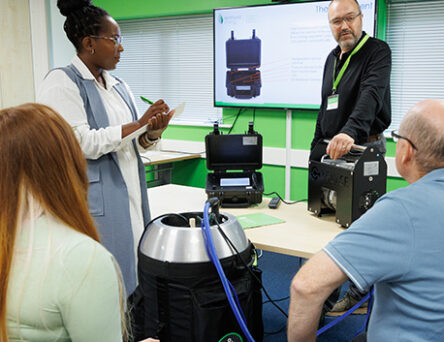
Airtightness Testing
Another valuable opportunity for new DEAs is Airtightness Testing. Recent updates to the way EPCs are calculated mean that airtightness results can now be measured and entered directly into assessments, improving their accuracy. Airtightness testing measures how much air escapes from a property through gaps and junctions, such as around windows, doors, and skirting boards. Upskilling to offer this service not only strengthens the quality of your assessments, but also sets your services apart from others who rely on default assumed values.
By integrating these additional services, you can maximise the value of each assessment, build stronger client relationships, and position yourself as a one-stop shop for property compliance.
Upskilling into Domestic Retrofit
Around four in five of the homes that will be occupied in 2050 have already been built, and most will require energy efficiency improvements and low-carbon heating upgrades to help the UK achieve its net-zero goals. In total, that’s around 29 million homes that will need some level of retrofit work over the coming decades.[1]
Retrofit is one of the fastest-growing areas in the energy sector, and DEAs are ideally placed to step into this space.
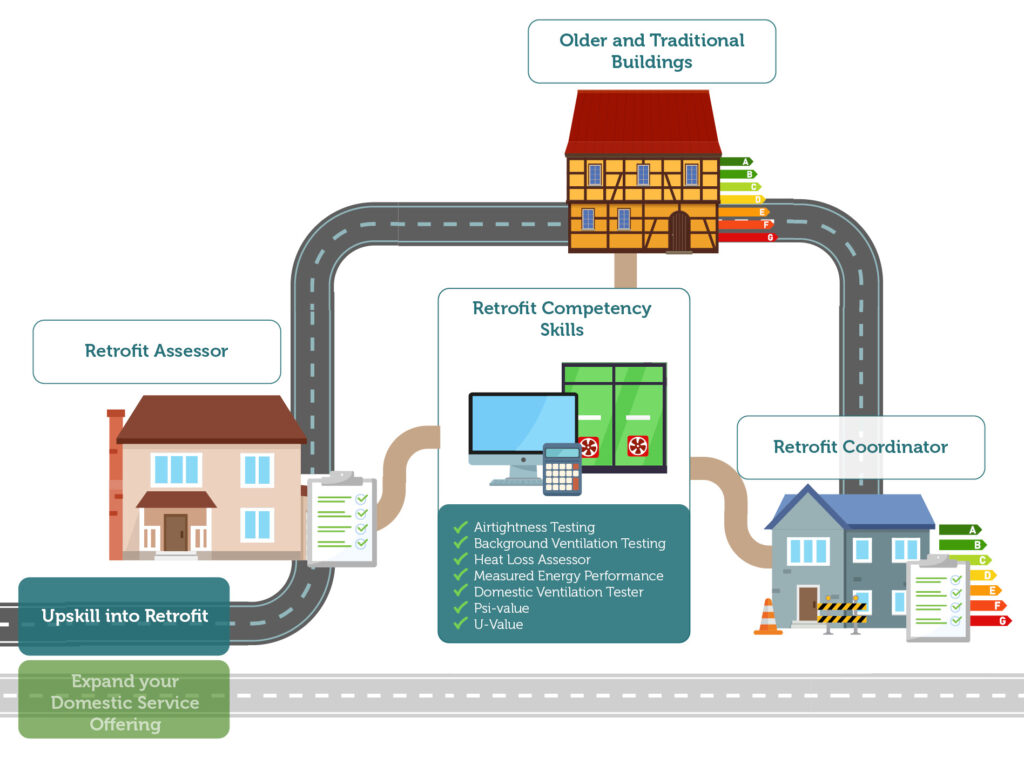
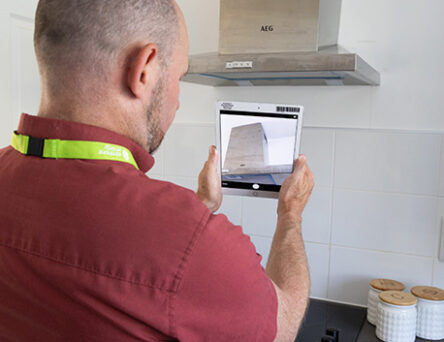
Retrofit Assessor
Retrofit Assessors carry out whole-dwelling assessments in line with PAS 2035 – the UK standard that sets out how retrofit projects must be completed. The standard ensures that every home upgrade is safe, effective, and achieves real energy savings. It also ensure that only qualified Domestic Energy Assessors can become a retrofit Assessor to make sure they have the required background knowledge to complete the role.
Assessors collect detailed information about a property’s energy performance, occupancy patterns, and condition, which is then used to design tailored retrofit plans. It’s a key role at the very start of every retrofit project, making it a future-proof and highly valued career path for qualified DEAs.
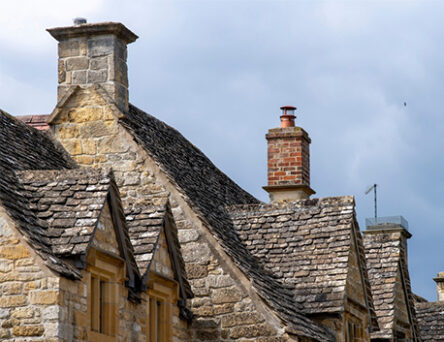
Specialist Knowledge for Older and Traditional Buildings
Around 21% of all homes in England were traditionally built before 1919.[2]
These properties require a specialist approach to energy efficiency to ensure that upgrades protect their character and performance.
Recent updates to PAS 2035, the retrofit standard, mean that professionals working on older or traditional buildings are now required to complete recognised training. Elmhurst’s Level 3 Award in Energy Efficiency for Older and Traditional Buildings provides the essential knowledge to assess, recommend, and manage improvements sensitively ensuring energy efficiency is balanced with building integrity.
Other Retrofit Opportunities
Once you’ve gained experience in retrofit assessments, there are further ways to expand your expertise and service offering.
Heat Loss Assessments are increasingly important for retrofit and low-carbon heating design. By calculating how heat escapes through a property’s fabric, DEAs can provide accurate data to support heat pump installations and other energy-saving measures.
Another valuable skill area is Background Ventilation. Proper ventilation is essential for maintaining indoor air quality and preventing issues like condensation and mould, especially in homes that have been upgraded for energy efficiency. Elmhurst’s Background Ventilation training helps assessors understand regulatory requirements and confidently assess whether a property provides sufficient airflow to support healthy, efficient living spaces.
For those looking to take their knowledge further, Retrofit Coordinator training is the next step after gaining solid industry experience. Retrofit Coordinators oversee entire retrofit projects under PAS 2035 which includes managing assessors, installers, and designers to ensure that each project meets quality and performance standards. It’s an excellent progression route for professionals who want to move into project management and leadership within the retrofit sector.
Diversifying into New Build and Commercial Work
Once you’ve established yourself as a Domestic Energy Assessor, your skills can open the door to advanced qualifications that broaden your expertise and client base. Two of the most popular routes are working in the new-build housing and commercial property sectors.
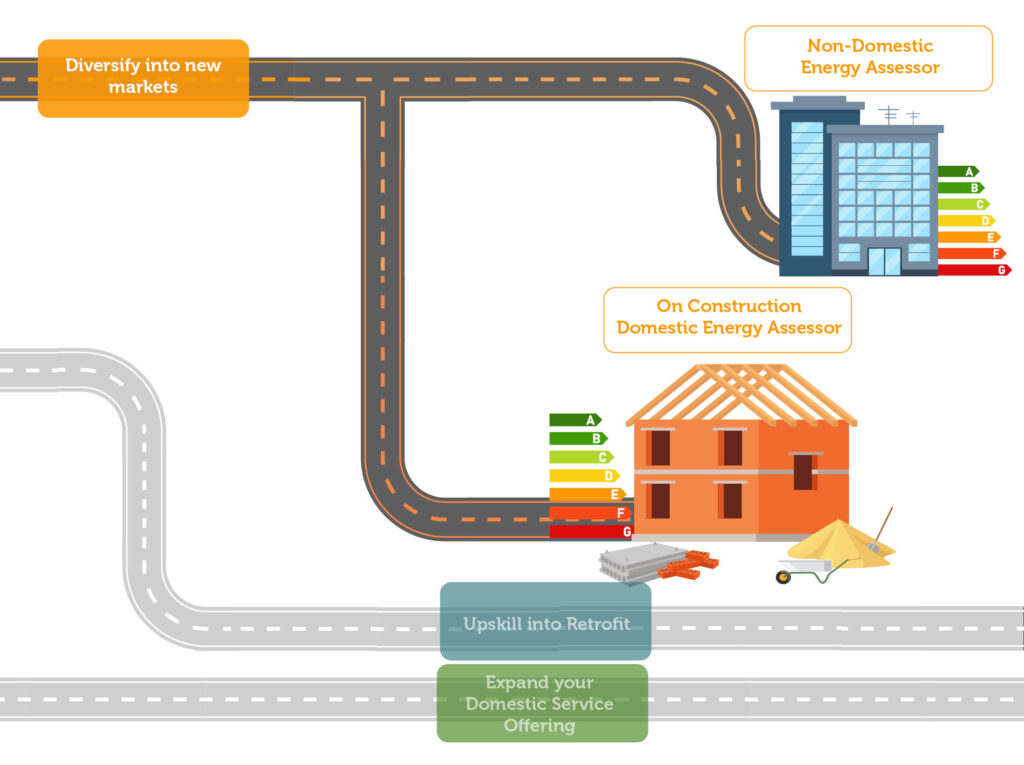
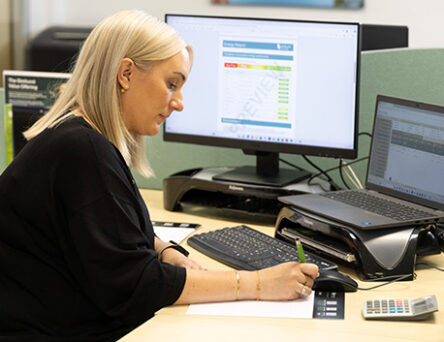
On Construction Domestic Energy Assessor (OCDEA)
OCDEAs use SAP (Standard Assessment Procedure) software to calculate and model the energy performance of new build homes and it is a desk-based role. They work closely with developers, architects, and builders during the design and construction stages to ensure that new dwellings meet Part L of the Building Regulations and perform efficiently once completed.
Every new home in the UK must have a SAP calculation and Energy Performance Certificate (EPC) before it can be sold or rented, which makes this a consistently high-demand role. It’s a great next step for DEAs who want to move from assessing existing homes to influencing the design of more energy-efficient properties.
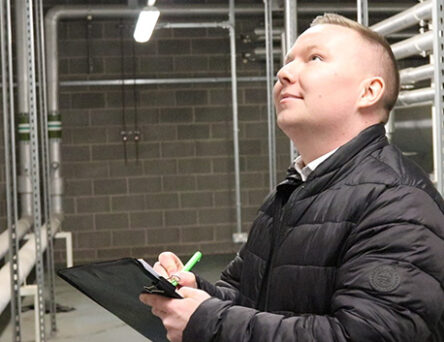
Non-Domestic Energy Assessor (NDEA)
NDEAs assess the energy performance of commercial buildings such as offices, shops, and industrial units. Using SBEM (Simplified Building Energy Model) or DSM (Dynamic Simulation Model) software, they evaluate how buildings use energy and identify opportunities to improve efficiency and meet legal compliance standards.
This qualification allows assessors to work on larger and more complex projects, supporting organisations in reducing their carbon footprint and achieving Minimum Energy Efficiency Standards (MEES) compliance. It’s a logical progression for DEAs who want to expand into the commercial energy sector and take on a wider variety of work.
Why Choose Elmhurst for Training?
Building a new career starts with choosing the right foundation. At Elmhurst, we believe that investing in your training is about more than gaining a qualification, it’s about making sure you set yourself up for long-term success in a growing industry.
As the UK’s largest government-approved energy efficiency and retrofit accreditation provider, Elmhurst has been at the centre of the energy assessment and retrofit sector for over 30 years. That experience means our training isn’t just about theory, it’s shaped by real industry practice and the evolving standards that define the profession.
We focus on helping you build your career the right way: developing practical skills, professional confidence, and a solid understanding of where your training can take you. From your first assessment through to advanced qualifications, you’ll have access to ongoing support from the industry’s largest support team, a variety CPD opportunities and you’ll be part of a network of professionals who are passionate about improving the UK’s built environment.
Take the Next Step
Becoming a Domestic Energy Assessor is more than just the first step into a new career, it’s the gateway to a sector full of opportunity. From supporting landlords and homeowners to shaping the UK’s journey to net zero, the skills you gain as a DEA can open doors to exciting roles in retrofit, new build, and commercial energy assessment.
If you’re ready to start building a rewarding, future-proof career, there’s no better time to take that next step.
ABBE Domestic Energy Assessor Training
With flexible options for remote and classroom study, find the course that’s right for you.
FIND OUT MORE
